The Pioneers of the Congregation are the first few batches of Sisters, who in close collaboration with their founder devised a specific style of life and lived out the charism and spirit of the Congregation, thus laying a firm foundation for a mission without frontiers. The first batch of six Sisters was a group of women, full of life and vivacity, eager to win souls for God. Their missionary enthusiasm and their unique individual contribution gave a definite shape to the missionary vision of the Founder. There was one thing outstanding in them: they had a good store of faith, humility, docility, simplicity and spirit of sacrifice. They were simple women who do not possess high social rank or intellectual sophistry, but good will, enthusiasm and zeal to spread the Gospel like the apostles of Jesus. These were the ideal group chosen by the Lord to realize one of His plans through the instrumentality of Bishop Ferrando.
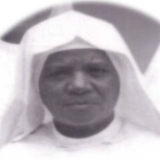 Sr. Agnes Surin, the youngest of eight children of Masidar and Kripa Surin was born on 2 January 1918. She was admitted in the boarding school at St. Mary’s Convent, Guwahati since she was five years of age. Though she was sent home after three years because of her naughty behaviour, after few years, she was accepted to the boarding again on condition that she would behave well. She was a changed Agnes then. She learnt to be submissive to her superiors and was no longer troublesome to her teachers and friends in the boarding.
Sr. Agnes Surin, the youngest of eight children of Masidar and Kripa Surin was born on 2 January 1918. She was admitted in the boarding school at St. Mary’s Convent, Guwahati since she was five years of age. Though she was sent home after three years because of her naughty behaviour, after few years, she was accepted to the boarding again on condition that she would behave well. She was a changed Agnes then. She learnt to be submissive to her superiors and was no longer troublesome to her teachers and friends in the boarding.
The seed of a missionary vocation sprang up in the heart of young Agnes during her stay in the boarding house. Though she received hardly any encouragement from the Sisters she did not allow her hopes to be dampened by their rejection. Her joy knew no bounds when she was permitted to join the new congregation that would be started by Bishop Ferrando.
Agnes entered the novitiate on 24 October 1942 and made her First Profession on 8 December 1944. Many of the mission stations in Assam bear the footprints of this great missionary. In spite of the many difficulties of visiting the interior villages in those days when there was no proper means of conveyance, Sr. Agnes and her companions were just too glad to carry the light of Christ to many souls through their missionary endeavours. Sr. Agnes was a moving force in all the missionary ventures of the Sisters wherever she was.
Speaking about her personality, Sr. Agnes was known as a self-sacrificing person. She was sensitive to the feelings of others and was always careful not to cause any pain or suffering to others. She herself would suffer without complaints be they physical or spiritual. She was most hospitable and saw to it that the visitors to the convent had good food and a comfortable stay. Even though the Sisters themselves lacked the bare necessities of life, she would never allow others to suffer any want. Visiting families, meeting people and praying for the sick were her apostolate. Being particular about the neatness and tidiness of the children of the boarding house, she would assist in bathing the younger ones, in mending their clothes and in learning their daily lessons. The admirable traits of kindness and gentleness made her a motherly figure to the children in the boarding. She worked as a Superior in many of the Houses.
She had special love for the poor and the suffering. She would never send away anyone empty-handed who came to her for material help. While she was at Lakhimpur, there were 100 lepers who used to come to the gate of the convent. She not only treated them with love and kindness but also entrusted a Sisters to feed and clothe them and provide them with medicines. She often reminded the Sister: “By doing this charity for these people you are clothing and feeding Jesus Himself.” She was an ardent devotee of Our Blessed Mother and took great care to instill in the boarders and people in the villages love and devotion for Mary.
Sr. Agnes served at various centers of Guwahati (Salesian Sisters), Tezpur (Salesian Sisters), Naharkatia, Dibrugarh, Lakhimpur, Tetenbari, Barpeta Road and Golaghat. She spent her last days in Dibrugarh and died of cancer of the bone on 20 December 1982.
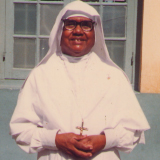 Sr. Blandina Tirkey was born on 19 March 1916 in the family of Emmau and Gundia Tirkey. She received love and care from everyone in abundance. The family migrated to Assam in search of good fortune and better living.
Sr. Blandina Tirkey was born on 19 March 1916 in the family of Emmau and Gundia Tirkey. She received love and care from everyone in abundance. The family migrated to Assam in search of good fortune and better living.
Fr. Orestes Marengo came across little Blandina during one of his missionary tours to the village of Kakrabari and brought her to the boarding school of the Daughters of Mary Help of Christians at Guwahati. From the very beginning she showed leadership qualities and was noted for her robust and dynamic nature. Being touched by the hard work and austere life of the Sisters, she wished to be like them. But she thought that she was not qualified to meet the high ideals which the Sisters embodied. When she expressed her desire to the superiors they could not accept her in their society. So she they encouraged her to join a diocesan congregation in Krishnagar, named “Catechist Sisters of Mary Immaculate.” After three months of her stay in Krishnagar she returned to Guwahati as she felt that her call was to serve the people of Assam. Thus, she joined the first batch of Missionary Sisters of the new Congregation founded by Bishop Ferrando.
Sr. Blandina was a hardworking person. She was ever ready to do any type of work, whether it be that of a carpenter, or of a mason, of a plumber, or of an electrician. All the minor repairs of the house was done by her. She was also a good cook. She was the assistant to the girls in the workroom and was always busy in sewing, weaving, knitting, and making stockings, candles and rosaries.
Sr. Blandina lived the words of the Founder, “Remain pure to spread the Gospel, live in poverty and make sacrifices for the love of Christ.” As a pioneer in the new Congregation, along with her companions, she underwent deprivation of all sorts and contributed much for the growth of the Congregation.
Though short tempered by nature she set an example by the humble acceptance of her faults in a spirit of forgiveness. Before retiring to bed she made sure that she was forgiven. Here was a good soul true to the admonition of the word of Paul; “The sunset must not find you still angry, do not give the devil his opportunity.” (Eph 4: 26)
In the second week of January 1991, she took ill with fever and diarrhoea. She also suffered from heart ailments. Sr. Blandina passed away on 17 January 1991 with a celestial smile on her face. She used to say that the Lord Jesus, her elder Brother, would never let her down. She was sure of the reward that awaited her after her laborious days of toil on this earth.
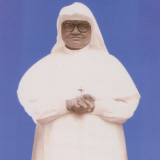 Sr. Elizabeth Kujur was born on 18 October 1913 in the village of Sugaruwa in Bihar. She lost her beloved mother when she was one and a half years old. Her father brought her up with much affection and care. He migrated to Assam and admitted his daughter in the boarding school at St. Mary’s, Guwahati to give her a good education.
Sr. Elizabeth Kujur was born on 18 October 1913 in the village of Sugaruwa in Bihar. She lost her beloved mother when she was one and a half years old. Her father brought her up with much affection and care. He migrated to Assam and admitted his daughter in the boarding school at St. Mary’s, Guwahati to give her a good education.
As she came across many girls who had come from outside North East India to join the Salesian Sisters, Elizabeth felt the desire to become a Sister. During the annual retreat in the boarding, she approached the superior and spoke about her desire. Her plea was refused which filled her with sorrow. She decided to leave the boarding and look for some other religious congregation that would admit her. Meanwhile, her father decided to give her in marriage. Earnest about her desire to become a religious, she returned to St. Mary’s Convent. Here she joined the Congregation of MSMHC and made her First Profession in 1944, at Guwahati, in the hands of the founder.
Her father was very dear to her and it must have cost her much to leave him. She renounced all that she loved. She knew the cost of discipleship. She learned to accept the difficulties of life with the help of her superiors. Being formed by the Salesian Sisters she had affectionate and grateful memories of them.
She was assisting the boarding girls and taught in the school run by the Salesian Sisters. She loved doing little things with perfection. She spent most of her time in the workroom doing embroidery, stitching uniforms for students, mending the torn clothes or replacing a button or two on the frocks of the children in the boarding house. She was a good tailor and taught the candidates and Sisters.
Sr. Elizabeth impressed everyone with her spirit of piety, poverty and sacrifice. She faithfully observed the Rules and encouraged others to do the same. Sr. Elizabeth Kujur lived the spirit of the Congregation and passed on to the younger generation of Sisters the charism that the Founder had entrusted them with. She died at the age of 97 after a brief illness on 18 March 1980, at Nazareth Hospital in Shillong.
 Sr. Mary Surin became one of the pillars of the MSMHC. The eldest daughter of Martin Surin and Martha Surin, Mary Surin was born on 25 December 1925, at Borheli village in Tezpur. She was affectionately called ‘Maryolin’. She studied in the boarding school the Salesian Sisters in Guwahati. It was there that she heard the Lord calling her to follow Him. She made her desire known to the boarding assistant and to the superior after her elementary studies. The response was not very encouraging. Maryolin refused to go home for holidays. On being asked her reasons for not going home by Fr. Attilio Colussi she told him that she wished to join a Religious Congregation. Having found her to be a beautiful soul ready to follow Christ Bishop Ferrando accepted her to be one of the pioneers of the newfound congregation. She pronounced her first vows in 1944 and became Sr. Mary Surin. She spent her life in the various mission stations of North East India and experienced the hardships and difficulties of the growing Congregation. They had nothing and lacked even the basic necessities of life but joy never left them.
Sr. Mary Surin became one of the pillars of the MSMHC. The eldest daughter of Martin Surin and Martha Surin, Mary Surin was born on 25 December 1925, at Borheli village in Tezpur. She was affectionately called ‘Maryolin’. She studied in the boarding school the Salesian Sisters in Guwahati. It was there that she heard the Lord calling her to follow Him. She made her desire known to the boarding assistant and to the superior after her elementary studies. The response was not very encouraging. Maryolin refused to go home for holidays. On being asked her reasons for not going home by Fr. Attilio Colussi she told him that she wished to join a Religious Congregation. Having found her to be a beautiful soul ready to follow Christ Bishop Ferrando accepted her to be one of the pioneers of the newfound congregation. She pronounced her first vows in 1944 and became Sr. Mary Surin. She spent her life in the various mission stations of North East India and experienced the hardships and difficulties of the growing Congregation. They had nothing and lacked even the basic necessities of life but joy never left them.
Sr. Mary Surin served the Congregation as a superior, teacher and assistant to the boarders. The missionary spirit in her is revealed when she volunteered to serve the lepers in ‘Molokai Leper Colony’ at Nongpoh in 1970. The lepers found in her an affectionate mother, a caring sister and a saintly religious. The warmest corner of her heart was reserved for the poor and needy. After her transfer in 1975, the people remarked that they have never come across such a zealous missionary.
Sr. Mary Surin suffered from a painful sickness of chyluria. She had to leave Bengtol in the same year of her arrival there in 1976 for treatment in Shillong. She suffered patiently and often told the Sisters who surrounded her that she was offering her pain for the Congregation, for good vocations and for the Church. She died a saintly death on 8 January 1977.
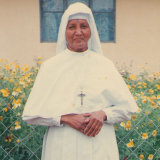 Sr. Veronica Kujur was born on 18 August 1917, in Ujratoli village of Katkahi parish in Ranchi. She was the eldest daughter of Francis Kujur and Anna Xalxo. Her parents migrated to Assam and settled down in Tezpur. She spent her time looking after the younger ones at home while her parents were at work in the fields. The catechist noticed this smart little girl and with the consent of her parents took her to the boarding school of the Salesian Sisters of Guwahati. She was good at studies and without much difficulty procured a teaching post after the completion of her primary education.
Sr. Veronica Kujur was born on 18 August 1917, in Ujratoli village of Katkahi parish in Ranchi. She was the eldest daughter of Francis Kujur and Anna Xalxo. Her parents migrated to Assam and settled down in Tezpur. She spent her time looking after the younger ones at home while her parents were at work in the fields. The catechist noticed this smart little girl and with the consent of her parents took her to the boarding school of the Salesian Sisters of Guwahati. She was good at studies and without much difficulty procured a teaching post after the completion of her primary education.
The enthusiastic nature of young Veronica impressed Fr. Aloysius Ravalico and Fr. Joseph Dal Broi who were on their missionary tours of Assam valley. On their enquiry about her future plans she expressed her desire to become a missionary. On their return, the priests spoke about Veronica to Bishop Ferrando and to the Superiors of the Salesian Sisters. Veronica was soon admitted to join the group of girls who were preparing themselves to begin the new Congregation founded by Bishop Ferrando.
Her sense of courage and loyalty to the Lord during her postulancy was manifested in her refusal of the proposal made by a young handsome soldier whom she attended in the hospital during the World War II.
Having a single aim of becoming a Religious and serving the Lord in His people, Sr. Veronica and her companions longed to go out and serve them. They knew that people outside the walls of the convent and thousands in the remote villages were waiting for them. She experienced the poverty, hunger and deprivation of even the basic necessities of life. But her love for Jesus, for her vocation, the missionary work and love for the Congregation helped her to undergo all these difficulties.
Touring the villages and visiting families was her greatest priority in the missions. She covered great distances on foot to interior villages in search of souls. Sr. Veronica was an active missionary till the very day of her death. On 22 June 1994, she visited families in Jalukie and late in the evening accompanied the Parish Priest along with another sister for the blessing of the house. At 1.00 a.m. in the night on 23 June 1994, she suffered a massive heart attack and passed away. 50 years of her religious life was lived beautifully with great enthusiasm and zeal.
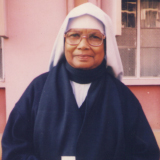 Tulia Dumbria, the third member of the family of five children was born on 21 July 1922 in the village of Dewgharia in Assam. She had her early education in the boarding school of the Salesian Sisters at Guwahati.
Tulia Dumbria, the third member of the family of five children was born on 21 July 1922 in the village of Dewgharia in Assam. She had her early education in the boarding school of the Salesian Sisters at Guwahati.
The dream of six lilies narrated by Sr. Luigina to the boarding girls stirred her from within. At the completion of her studies at St. Mary’s, Sr. Luigina asked Tulia about her future plans. She expressed her desire to become a Religious Sister in the new Congregation, which Bishop Ferrando was founding.
Tulia lost her beloved mother while she was in the novitiate. She was asked to go back home by her brothers to get married and take the place of her mother. But these would not deter her desire to give herself to the Lord.
When asked about the beginnings, everything seemed joyful for her and her companions. Nothing seemed too difficult for her when it was a question of making sacrifice, when everybody thought of the other in the midst of poverty and want. They fetched firewood from the jungle, split the logs, cooked food, scrubbed the floor and worked in the laundry. Sr. Tulia said that they did everything for the love of the Lord and found joy in accomplishing their duties. The candidates had very few things to call their own: one little lantern was used in the refectory, chapel, study hall and in the dormitory. But they were contented with those little comforts in life.
Sr. Tulia spent most part of her missionary life educating the young children in schools and boarding houses. She also led women’s associations like ‘Mahila Sangath’ and assisted young women to prepare themselves for good Christian marriage.
Since 1993 she had been at Little Flower Convent, Malki, Shillong, teaching children in the nursery class, assisting the pupils and teaching catechism. In the simplicity of her life one can find the fragrance of a saintly life lived out totally in love for the missions.
Sr. Tulia had the privilege of witnessing the growth of the tiny seed of the congregation into a big tree and participated in the Golden Jubilee celebrations of the foundation in 1992 while all her companions have gone to receive their eternal reward. Sr. Tulia passed away on 7 March 2000.
These brave pioneers laid a firm foundation for the work of evangelization and left for the younger generations a rich and lasting heritage. The six lilies continue to spread their fragrance around. The Lord blessed the humble beginnings with rapid growth and rich missionary harvest. Its growth in obscurity and hardship and the immeasurable trust and faith of the Founder who believed in the power of the Almighty are monumental testimonies of God’s unbounded love. The spark of that missionary spirit was lit and passed on by these brave pioneers of the Missionary Sisters who deserve a rich tribute of love and gratitude today.


